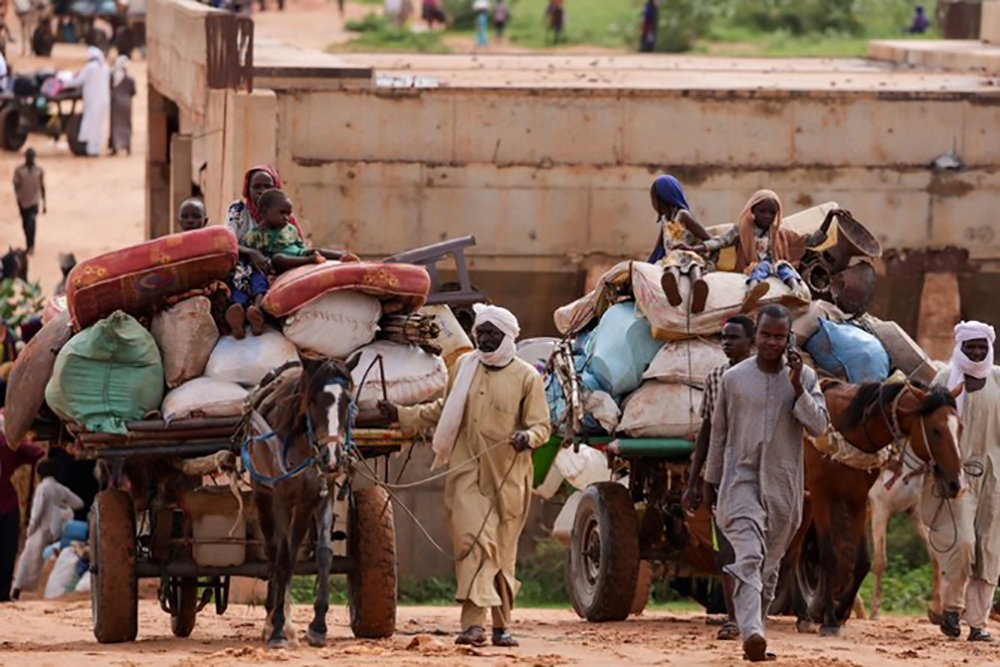
War Within War: The Chronic Crisis of El Geneina and the Prescription of the Jeddah Forum
Abdullah Rizk Abusimazah
At a time when the Rapid Support Forces threatened El Geneina after taking control of Nyala and then Zalingei, in an escalation that coincided with the resumption of Jeddah talks to end the war and restore the path of civil democratic transition, it means including it within the general crisis, it is not expected that any ceasefire agreements and cessation of hostilities, which result from the ongoing negotiations in Jeddah between the Rapid Support Forces and the armed forces, will automatically stop the chronic war that makes El Geneina a theater for it. For the El Geneina war has its specificity as a local crisis that distinguishes it from the general crisis arising from the April 15 war.
The Jeddah Forum is concerned with stopping the April 15 war between Al-Burhan and Hemeti, while the roots of the El Geneina war extend beyond that date and even before the transitional period. It can be concluded that the El Geneina war is a remnant of the 2003 war initiated by the Darfur Liberation Movement, which means that the El Geneina war needs its forum and a package of radical solutions that go beyond the prescription of the Jeddah Forum.
During the past four years, since the battles at the end of 2019 and until the killing of Khamees Abkar in June 2023, El Geneina witnessed no less than four rounds of civil fighting. It received more than one delegation from the central government, where it was visited, starting with Dr. Abdalla Hamdok, the Prime Minister, at the beginning of 2020, as part of a large delegation to inspect the situation and calm it down, restore security and peace. It also received, at later times, and in the wake of civil fighting, other senior officials, the last of whom was General Abdel Fattah Al-Burhan, head of the Transitional Sovereignty Council, in April 2022, where he presented a plan that includes the withdrawal of all militias from the city and digging a trench to prevent the infiltration of foreign fighters.
It is noteworthy that the Juba agreements, which were signed by the armed movements, and the accompanying understandings, above and below the table, did not have a tangible impact on the situation in the region, and in the state in particular, which makes it likely that these agreements and understandings have deviated from the straight path of addressing the roots of the crisis.
Due to the chronic tension that threatens peaceful coexistence between the population components of El Geneina, the possibility of fighting breaking out at any time and for any reason remains. Once, a dispute broke out between two young men near a tea vendor, about who gets his tea order first, which ended with one of them killing the other. In another case, the dispute and fight that also ended with the death of one of the two disputants was over the ownership of a mobile charger, as reported in the newspapers at the time. In both cases, the tribes of the disputants were drawn into a wide arena of revenge and vendetta.
The El Geneina war is characterized by its external dimension. More than once, it was mentioned that Arabs from Chad participated alongside the Arabs of El Geneina in the tribal fighting. Due to the increasing militarization of the conflict in the state as a result of the spread of weapons, and the local authorities had a role in this, the majority of the citizens were distributed according to tribal lines on the movements and their militias. What is also noteworthy in this context is that the former governor was the leader of a militia that had a presence in the conflict map. The fighting has had dire humanitarian consequences, as indicated by the outcome of the killing, displacement, and internal and external displacement.
However, the frequency of fighting rounds, which sometimes lack the participation of one of the parties to the April 15 war, or both, did not prevent the civil society and community leaders in El Geneina, who raised the slogan "El Geneina is Safe" from an early time, from continuing their peaceful initiatives by mediating to stop the fighting and restore peaceful coexistence between the components of the city and the state. These anti-war civil forces are worthy of having a role in any historical peaceful settlement of the prolonged conflict.

